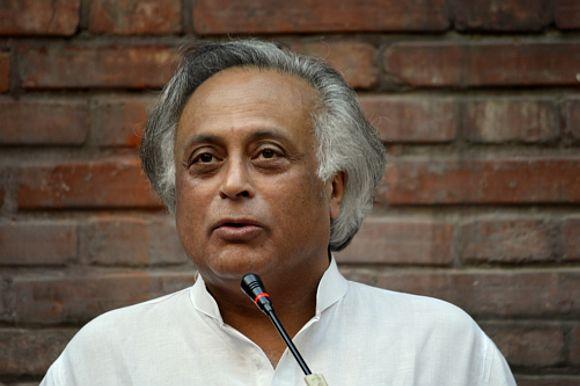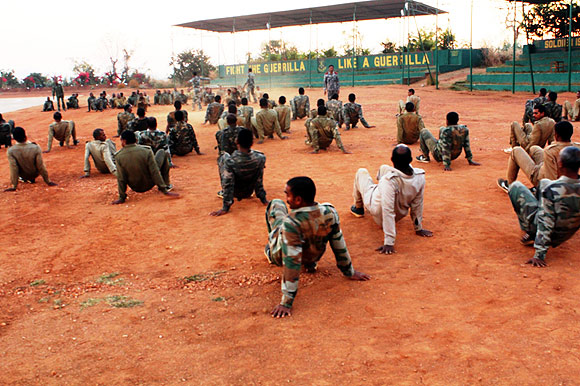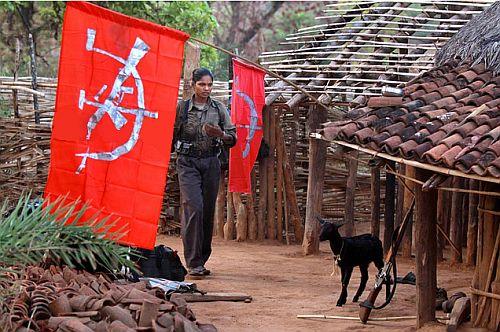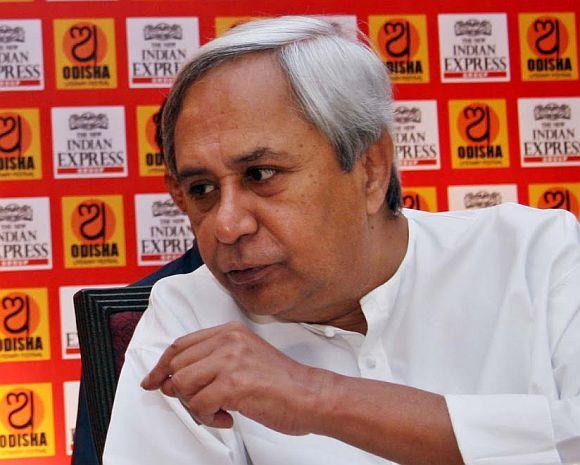 | « Back to article | Print this article |
Maoists are no longer motivated by ideologies: Jairam
In an exclusive interview with CNN-IBN's Deputy Editor Sagarika Ghose, Rural Development Minister Jairam Ramesh said that there was nothing ideological about Maoists anymore, as they were extortionists and criminals.
On failure of strategy
No, I think the strategy has to continue to be a combination of different elements, first very tough security and police action in affected areas like southern Chhattisgarh. Second, deeper political engagement and political mobilisation by political parties, Third, very sensitive, very integrated developmental intervention, particularly to address the problems of tribals and fourth, redress the injustices, particularly in the case of land reform policy.
Fact remains that this is going to be carnage of unprecedented ferocity. One should realise that there is a large part of Chhatisgarh especially Bastar, Kanker, Narayanpur, Dantevada, Sukma, Bijapur etc. which are liberated.
These are liberated zones. You have areas of 6,000 to 10,000sq km, where the sarpanch the collector, or the politician cannot go to the panchayat development officer PDO. These are liberated zones so to speak, where the arm of the Indian state, simply does not function.
On whether dialogue is still an option
When Chidambaram was the home minister, he repeatedly said in Parliament and outside, he laid down three conditions -- don't lay down your arms, don't give up your militia, don't abandon your ideology, but come for talks, but no talks took place.
Now I have read comrade Ganapati's long interview, where he says that from the Maoists side the two preconditions should be -- that all their leaders should be released and all those leaders should be interlocutors and second that the ban should be removed from organisations such as the Communist Party of India-Maoist.
I believe that you can have a dialogue with people who are interested in having a dialogue, but how can you have a dialogue with forces who do not believe in democracy. I have had long discussion with people such as Varvara Rao and all these intellectuals, who speak for the Maoists they clearly do not have faith in democratic system, they do not have faith in constitutional values.
I don't think we should not rule out the option of dialogue. But the questions is whom do you talk to and what do you talk about?
Click NEXT to read further...
On the carrot and stick approach of the government
From 2004 onwards, this government has consistently taken the stand that this is both a serious law and order issue and this is also an issue that is a socio economic in nature. It is in this context that I want to say that this attempt to romanticise the Maoists, I think is completely misplaced , because the Maoists to my experience are no longer actuated by ideologies, these are extortionists, they are extracting money from the government contracts, companies.
They indulge in looting and also the recent killings showcase their stand. They are recruiting eight-year-old kids, my own secretary who was an Indian Administrative Officer of the Orissa cadre, who was abducted for 10 days in Malkangiri, two-and-a-half years ago, was abducted by kids who were 10, 12 years old.
I believe that if we continue to live in the delusion, that the Maoists are speaking in behalf of some tribal issue, I think that it is completely misplaced and they are no longer an ideology driven force, the issues that they raise relating to tribal deprivation, tribal disconnected, tribal discontent are real issues which the Indian state needs to address and the way to address it is to recognise that in the past, issues of tribal development have not been given importance by the government we look at tribal areas from the point of view of minerals and mining.
I think we should look at the tribal areas with the point of view that these are places where people live, they have their livelihood, lakhs and lakhs of tribals have been displaced and are subject to multiple displacement, all these are realities. But this can't be a cause for the carnage you saw in Chhattisgarh.
On author Arundhati Roy's views on displacement
I like her language and the way she writes but I can't take her seriously. I myself have called for a moratorium on mining in the areas such as Saranda forest (in Jharkhand) for example. If we are going to open up the area for mining, people from outside are going to come in, the tribals are not going to get employment as the areas are going to be deforested and we are back to square one.
I'm sympathetic to the argument that we should have a gradual approach to mining in the forest areas.
Click NEXT to read further...
On slain leader Mahendra Karma
I have seen some liberals coming out. This is a wrong time to talk about this issue. The fact of the matter is there are different views on what Karma did. But Karma was not your arch-type adivasi leader. He was aggressive, he wanted modern industrial development, he had his own views on how Maoists should be tackled.
I don't think this is the time to think whether he was right or wrong. I have some serious reservations on the Supreme Court judgment. The people who filed the public interest litigation are very close friends of mine, whom I respect intellectually, whose integrity is unquestioned, but the fat is that I don't agree with them entirely.
Karma was an active politician, that's the key here, he was retrieving lost ground for the Congress, in the greater Bastar region and he was killed because clearly there are forces in Chhattisgarh, especially in the southern areas, who do not want the Congress to be strong, who do not want political activity to happen in these regions.
On development being held back due to violence
"These are setbacks but we can't deviate from the path which I have set out. This is a combination of tough security operations in the areas like southern Chhatisgarh, of deeper political engagement across the political spectrum, of very sensitive tribal oriented development, of some restitution or some sense of justice for the injustice perpetrated in the past particularly from the point of view of land acquisition and R&R. We can't get away from this drive."
On lack of clarity in approaching the problem
There is a developmental response, there is a security response and also there has to be a political response. Let me give you the example -- Andhra Pradesh. This is the state that saw the birth of Maoist movement in many ways; the top leadership of Maoists are from Andhra.
But in the last 30 years there has been a transformation in Andhra Pradesh. It happened because of tough police action, the greyhounds. It happened because of focused developmental activities. Thirdly it happened because the political parties have engaged themselves with the local communities. In Chhattisgarh, Odisha and Jharkhand you don't have this and what you are witnessing now is manifestation of a phenomenon where the state is now confronting Maoists and we are having such violent backlash.
Click NEXT to read further...
On West Bengal Chief Minister Mamata Banerjee
Jangal Mahal was first liberated by the Central Reserve Police Force. There was a security operation. It cleaned up the place. The Trinamool Congress had a rally, the Congress had a rally and the political activities returned to Jangal Mahal.
The problems have not been solved now completely but you can see some development interg of Jharkhand, met me and said, 'sir the one photograph of Mamata Banerjee kissing the baby in Jangal Mahal is equal to many battalions of the CRPF.'
But jangal Mahal is different from southern Chhattisgarh.
On importance of security operations
I've never romanticised the Maoists and I never demonise the security operations. Saranda, which is laboratory for developmental interventions, development could have not been possible without Operation Anaconda.
The CRPF cleared up 900sq km area in the Paschim Singbhum district, we would have not been able to be doing what we are doing now. We are building roads, giving Indira Awas, creating skills for the local youth and other developmental activities, which should have been done 50 years ago. We are just giving the people what was their due.
On no consensus between the home ministry and the rural devt ministry
The home ministry is responsible for security operations. The ministry of rural development is responsible for developmental interventions. The ministry of tribal affairs is responsible for welfare of the tribals.
The ministry of environment and forests which is playing very important role in these areas is responsible for a sensitive forest administration. There is no question of soft line or tough line.
Click NEXT to read further...
Lack of clarity on fighting against Maoists
Why are you putting the searchlight on the Indian government? Why are you not asking this question to Odisha Chief Minister Naveen Patnaik? Why are you not asking this question to Jharkhand Chief Minister Raman singh or former CM Arjun Munda. They are the people who are responsible.
Ultimately, the state government is grappling with the help of the Central forces. But how many of these leaders have gone to these areas, have understood the problem in these areas and tried to intervene. Why is it required for someone from Delhi to intervene?
On Maoists entering the political process
This is a battle between two competing missions. This is an ideological battle we are engaged. It's clear that the Maoists don't believe in Indian system of Parliamentary democracy. Why can't they come and participate in local elections.
Why can't they participate in Assembly elections. Track record of Indian state to absorb people who it has fought is exemplary. Indian state fought with Pu Laldenga and he became the chief minister of Mizoram. The Indian state fought against All Assam Students Union, but it became Asom Gana Parishad and formed the government in 1985.
I've a colleague in Parliament who is an MP from Palamu in Jharkhand, who is a former zonal commander of Maoists. He is a Jharkhand Mukti Morcha MP.
He has come to the political process. If you have concerns come to the political process or possibly 'do a Kejriwal'. I'm not an admirer of Kejriwal but he is participating in the electoral process.
TOP photo features of the week
Click on MORE to see another set of PHOTO features...




